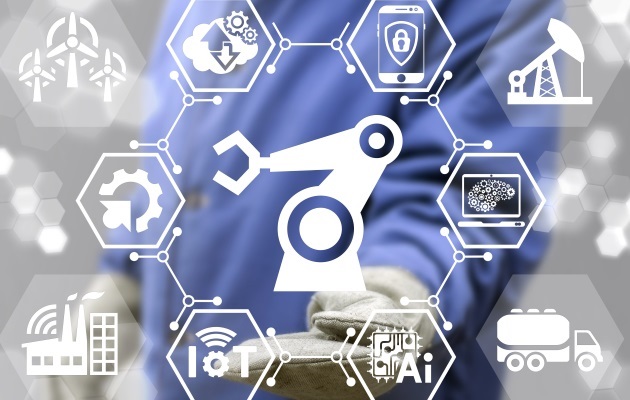Industry 4.0 is a movement that transforms production processes by combining the internet of things, cloud computing, big data analysis, and Artificial Intelligence. This new industrial revolution aims to make production lines smarter, more flexible and efficient. The role of artificial intelligence in this movement is to optimize production processes through machine learning and deep learning techniques, predict failures in advance, and increase production quality.
Artificial Intelligence: At the heart of Industry 4.0
Artificial intelligence is one of the most important components of Industry 4.0. By analyzing the data flow in production processes, it provides unique insights and automation opportunities. This both increases the efficiency of the production line and raises the quality of the product. AI also reduces costs and ensures production continuity by predicting failures in intelligent maintenance systems in advance.
Smart Factories and Operational Efficiency
One of the cornerstones of Industry 4.0 is smart factories. Robots, sensors, and IoT devices supported by artificial intelligence, automate production processes saving time and cost. This technological transformation makes production lines more flexible and increases their capacity to respond faster to customer demands.
Digital Twins and Simulation: The Role of AI
Artificial intelligence, along with digital twins and simulation technologies, takes production processes even further. Digital twins are virtual models of physical objects or processes and AI, can run simulations on these models, identifying and solving problems that may be encountered in the real world. This is revolutionary for production process optimization.
Sustainable Production and AI
Artificial intelligence plays a critical role in achieving the Industry 4.0’s sustainable production goals. AI algorithms optimizing energy use, systems reducing waste amounts, and automation technologies improving resource use, enable greener and more sustainable production methods.
A Look into the Future: The Shared Future of AI and Industry 4.0
Artificial intelligence and Industry 4.0 together are a revolutionary force in the production sector. This technological synergy makes factories smarter, more flexible and sustainable, while also increasing production quality and reducing costs. However, it is necessary to pay attention to issues such as adaptation to changes in the labor market, education, talent development, and ethical management during this transformation process. Artificial intelligence and Industry 4.0 together constitute a duo that deeply affects not only the technological aspects of the industrial revolution but also its social and economic impacts.
Investing in Education and Workforce
The future is certainly shaped by technology; however, the most important capital required for building this future is human resources. Artificial intelligence and Industry 4.0 will cause significant changes in the labor market. Therefore, it is crucial to educate the existing and future workforce in a way that understands, uses, and manages these new technologies. Continuous learning and re-skilling are among the keys to successfully managing this transformation.
Ethics and Sustainability
The ethical use of artificial intelligence and Industry 4.0 technologies is one of the key factors determining whether this new era will be sustainable. Data privacy, workers’ rights, the social impacts of automation, and environmental sustainability are important issues that all stakeholders should take into account. Alongside technological progress, the ethical management of this advancement is the key to societal acceptance and success.
Technological Democratization and Access
The spreading of the benefits of Industry 4.0 and artificial intelligence technologies to a broad segment will ensure this transformation is fair and inclusive. Technological democratization facilitates access to these new tools for a wider user base, while also paving the way for innovation. This allows small and medium-sized enterprises (SMEs) to benefit from smart production systems, thereby increasing their global competitiveness.
Conclusion: The Synergistic Future of Artificial Intelligence and Industry 4.0
The combination of artificial intelligence and Industry 4.0 is fundamentally changing the manufacturing industry and reshaping the economic landscape of the future. These technologies, by making production processes smarter, more flexible, and more sustainable, provide great benefits to both businesses and consumers. However, the success of this transformation depends not only on technological innovations but also on social adaptation, ethical management, and continuous education. In the future, all stakeholders will need to work together and develop a common vision to shape this new era in order to best utilize the opportunities offered by artificial intelligence and Industry 4.0.


